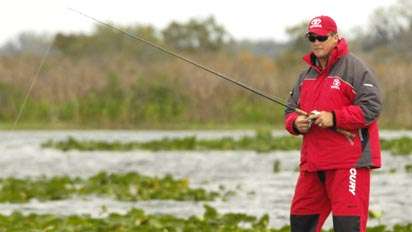
Fishing strategy during the Bassmaster Classic has evolved greatly over the years, primarily because of the increased spectator traffic on the water.
The impact of these fan flotillas has made mere mortals out of past pre-Classic favorites like David Fritts and Jason Quinn. There is no way that even the most thoughtful packs of spectator boats can avoid impacting the patterns of a fan favorite — regardless of whether his pattern involves shallow or deep water.
Believe it or not, it is the spectator traffic that has created two schools of thought on this philosophical question — how important is it to get off to a fast start in the Classic?
The importance of getting out of the gate quickly is certainly not lost on the field in the 37th Classic Feb. 23-25 on Alabama's Lay Lake. But they do not agree on whether it is wise to jump out into the lead in the opening round.
"It's very important," said Florida's Terry Scroggins, the consensus pre-tournament favorite in the 2006 Classic. "The Classic is winner-take-all pretty much. So you really need to start fast and take advantage of the three days you've got and do well every day."
Texan Gary Klein, who will be competing in an impressive 25th Classic, agrees.
"I really think the most important thing is getting off to a fast start right out of the box and then catching fish every day," he said. "I think it's really important to get off to a good start in this event. I kind of feel that the winner will usually establish himself the first day with a top 10."
Whether it's the shortened fishing days, the hoopla that dominates the event, the distractions and demands on the contenders' time, the modern-day top-25 cut after two rounds or the impact of the spectator boats, the fact is that there have been very few dramatic comebacks in the 36-year history of the Classic.
Only two pros (Don Butler in 1972 and Rick Clunn in 1990) have gone on to win the Classic after opening up outside of the top 10 on day one. Only 12 of the 36 Classic champions were victorious after starting outside of the top five.
A few, like Clunn in 1984 and Jay Yelas in 2004, jumped out to a big lead right away and were never threatened.
Veteran Skeet Reese believes that the biggest limiting factor in terms of making a comeback is the length of the three-day Classic.
"It's not different than any other tournament," the California pro said. "If you want to have a shot at winning it you need to put yourself in contention the first day. Probably even more so because it's only a three-day tournament.
"It can be done, but I think you need to put yourself in a top-10 position to have a shot at winning going into the last day. Because it is a short tournament you have to have a good start to put yourself in it."
It is a fact of life that the spectator traffic has gotten increasingly bigger with each passing Classic — to the point where the opening-round leader is "going to be cursed with follow boats the second day," according to Clunn.
Oklahoma's Jeff Kriet represents the thoughts of many Classic contenders by preferring not to be among the leaders on the first day. In other words, he would rather let the leaders attract the spectators while he fishes in relatively anonymity.
"I'm not thinking I have to go out and blast 20 pounds the first day," the four-time Classic qualifier said. "I'd love to catch 12 or 13 pounds the first day — something like that so you're still in it.
"I'm going to make sure the first day that I catch my five and at least have enough weight to be in it. Then you can determine that 11 pounds a day is not enough and I need to go out there and catch a big sack. The first day I'm just going to make sure I do my best to catch five.
"The old cliché that you can't win the Classic on the first day is true, but you can lose it."
Of the three Classic competition rounds, Kriet considers the second day the most pivotall.
"Because you can't have a chance to win unless you make the top-25 cut," he noted. "I think the second day is moving day. You want to be in a position where if you go out the last day and catch 18 to 20 pounds you have a legitimate chance to win.
"As long as I finish in the top 18 or so the first day, I think I'm fine. The second day you have to turn it on. You have to make the cut. You damn sure can't win it is you're working the (ESPN Outdoor) Expo the third day."




